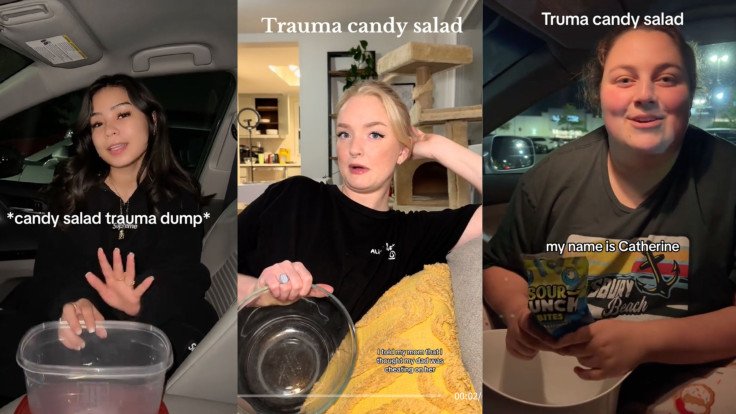Psychotherapist Breaks Down TikTok's Trauma Dumping Trend: A Cry for Help or Harmful Oversharing?
From parking lots to fast food drive-thrus, no place and nobody is safe from the trauma dumping trend.

Trauma dumping, the act of sharing deeply personal and emotional experiences in a public, unfiltered manner, has become increasingly popular on TikTok. While it offers some users a sense of catharsis, experts warn that it can have unintended consequences for both those sharing and their audiences.
The 'Trauma Candy Salad' Trend
One prominent example of trauma dumping is the viral 'Trauma Candy Salad' trend. Participants share their most intimate and often distressing stories while partaking in a lighthearted activity, like preparing a dessert. In one widely shared video, a user named Lily disclosed her mother's addiction and her father's violent crimes. Her friend responded with a similarly shocking anecdote about being locked in a room with a therapist during a severe anxiety episode.
Although sharing trauma can help reduce its emotional intensity when done constructively, the trend lacks meaningful engagement. Instead of processing trauma in a therapeutic environment, participants exchange stories without deeper exploration or resolution, as reported by Metro.
Trauma Dumping in Public Spaces
Trauma dumping isn't confined to online exchanges—it often spills into real-world interactions. For instance, one viral TikTok video featured a woman at a McDonald's drive-through paying for the next customer's meal while announcing that it was the National Day of Remembrance for Homicide Victims, sharing that her husband had been brutally murdered. The employee's startled reaction and the video's rapid spread as a meme highlighted the awkwardness of uninvited emotional disclosures.
Critics argue that such behaviour unfairly burdens unsuspecting individuals. TikTok user @mother.of.allofthethings suggested that the way trauma is presented greatly impacts how it is received. "If we don't treat our experiences with the seriousness and respect they deserve, how can we expect strangers to do so?" she asked. These incidents illustrate how poorly timed revelations can trivialise genuine grief and turn private pain into public spectacle.
@keenobald Bro is trauma dumping at a mcdonalds drive through 💀 #meme #fyp #funnyvideos #mcdonalds #starbucks #rememberanceday #traumadump #trauma #ithinkyoushouldleave
♬ original sound - KeenoBald
The Appeal and Risks of Trauma Dumping
Experts believe the trend stems from a growing sense of isolation and a lack of traditional social outlets. YouTuber Salem Tovar suggested that individuals who engage in trauma dumping often lack a "third place," a neutral social space like a park or community centre where they can safely share personal experiences. In the absence of these outlets, social media becomes a stand-in for community and connection.
However, while social media allows users to feel seen and heard, it also opens the door to desensitisation. Frequent exposure to distressing content can leave audiences emotionally fatigued, and online anonymity encourages mockery rather than support.
Expert Warnings About Oversharing
Psychotherapist Sandra Jimenez, who has 32 years of experience, warns that trauma dumping often stems from loneliness and the search for validation. "People share posts throughout the day seeking emotional support from followers, but these interactions are often superficial," she explained. Jimenez also highlighted the long-term dangers of public sharing, noting that once something is online, it cannot be retracted.
She cautioned that trauma dumping can expose individuals to bullying and harassment. "The internet creates an environment where people feel free to attack others, often worsening the emotional toll of sharing," Jimenez said. While expressing oneself can provide temporary relief, it is not a substitute for professional help or genuine interpersonal relationships.
Navigating the Trend Responsibly
Although trauma dumping can foster a sense of community, it raises questions about boundaries and appropriateness. While openly discussing mental health is important to reduce stigma, these conversations are most effective in controlled, supportive environments like therapy or support groups. Sharing traumatic experiences publicly, without preparation or understanding, risks trivialising them and creating further harm.
True recovery from trauma involves more than simply venting online—it requires deliberate and often professional care. While TikTok's platform allows for solidarity and connection, it is crucial to approach these interactions thoughtfully to ensure they do not cause more harm than good.
© Copyright IBTimes 2025. All rights reserved.






















